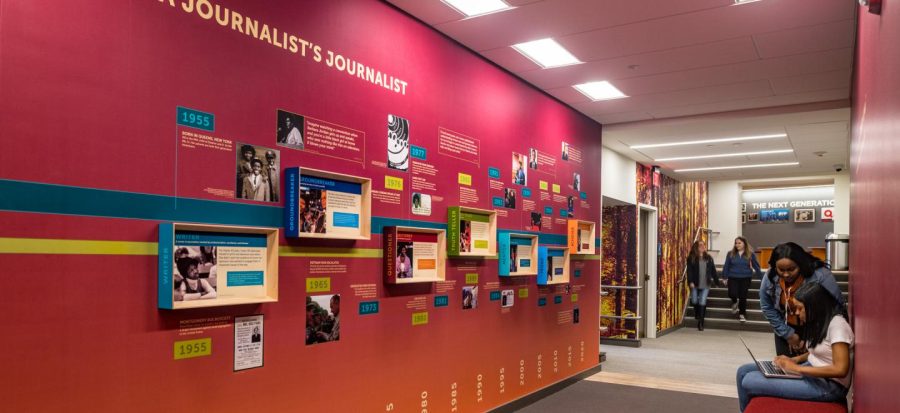Think Communications is an easy major? You’re wrong.
Although it is a commonly held belief that our most difficult assignments include drafting Instagram posts, we regret to inform you, this is far from the truth.
December 26, 2022
You may have viewed the TikTok interview where the creator asks college students, “what is the easiest major?” Unfortunately, to no shock to us, all interviewees responded with the same answer: Communications.
Although it is a commonly held belief that our most difficult assignments include drafting Instagram posts, we regret to inform you, this is far from the truth. It’s difficult to discern where the rumors about Communications being a breeze started, but it seems to be an idea that students hold on to, regardless of whether the rumor is based in fact or not.
The Simmons community, as with other university communities, might be in the dark about all the nuances in the communications industry; but one thing remains the same, if you’re not in the major you may not know that there is a highly evolved skill set needed to achieve success.
As students in the major, we’ve developed three reasons we believe Communications is not the easiest major – as stated in the TikTok video. Communications majors don’t “get all of our work done Mondays and then party the rest of the week” (although that would be nice).
1. We have to be highly strategic
When people hear the word “communications”, they typically think of having a conversation, composing an email, or sending a text. While this might be true for day-to-day interactions with friends or coworkers, the communications field is highly intricate, characterized by hours of planning, research, and implementing feedback.
When pursuing any professional communications effort, versatility is essential for success. In order to best appeal to—and engage with—various audiences, communications professionals pull from a deep understanding of a variety of disciplines, and apply their expertise in areas like graphic design, copywriting, journalism, social media content and analytics, and public relations (to name a few!). It’s next to impossible to be able to move fluidly through disciplines–and the only way to do that is through real, tangible experience.
One thing we’ve learned from being involved in Studio 5, student-driven media, and the production of CommWorks, is that in order to hone these skills, we must put them to practice. This experiential learning has helped us garner strategic thinking skills that prove invaluable when entering the workforce.
In fact, according to Harvard Business Review, the ability to think strategically is critical in career advancement. It shows employers that you are capable of high-level, independent thinking, regarding both external and internal forces and making decisions accordingly.
2. We have to work across industries
One piece of advice we’d like to offer our Simmons community is to understand that in every workplace, and in every field, you can find professional communicators. Why? Because communications professionals are multi-faceted.
Behind the scenes, communicators take-on a researched-based, factual approach to everything we do. Much of our research includes understanding the industries we’re working in—meaning it is vital for us to become well-versed in trends, information and news happening in a variety of sectors in order to persuasively communicate with the public and target audiences.
Professionals across all industries (yes, even you science majors) will likely interact with a journalist, a designer, a copywriter, a public relations agent etc. So, it is our duty as communicators to become experts and learn the ins and outs of whichever industry we’re creating on behalf of. Over time, we may switch industries, so it’s a lifelong learning process.
3. We put our money where our mouth is
The reason we’re writing this piece you’re reading is because we took control of our senior capstone course to try to practice our skills in real-time. Professor Markos gave us the choice to either learn from the textbook or do a campaign for the remainder of the semester–we chose to do this ourselves. Throughout our semester in COMM 325: Creating and Managing a Communications Campaign, we took our work beyond the classroom and created our own public relations campaign. The subject of our PR campaign? The communications discipline.
First, we identified the common misconception that Communications is an easy major. Being from the major ourselves, we began research on the industry. We found that communications is a female-dominated field, but that only 30% make it to leadership positions.
What we do in many of our Simmons classes proactively prepares us to be part of that 30%–and while some of our competing institutions boast the same sentiment, we thought the media would want to hear how we do it here. The place we decided to place most of our efforts was garnering attention from the traditional media.
We developed a list of targeted media contacts, wrote personalized pitches and sent them to various journalists at publications such as Higher Ed Dive, Inside Higher Ed and U.S. News & World Report.
While this story didn’t seem to engage journalists, we realized the audience we wanted to most appeal to was our own Simmons community. Just like the “real” field, when our strategy didn’t pan out the way we expected; we had to find a different way to tell our story (there’s the flexibility coming into practice).
This experience provided us with a real-world example of how communications efforts consistently change and how it is essential to build resilience and adaptability to get important stories told.
Overall, we ask that when you’re reading your next news article or pointing out your favorite logo, you recognize the sheer amount of research, planning, and creativity that goes into the work. Students considering the major have the unique opportunity to tell meaningful stories and spark conversations which can dictate anything from the political candidates that we elect to what we have for breakfast. Are you up for the challenge?









Diane Grossman • Jan 10, 2023 at 4:05 pm
Great article–I learned so much! And it strikes me that the skills you’re developing through your work in Communications are skills that are vital to all professions. Thanks so much for this insightful piece.